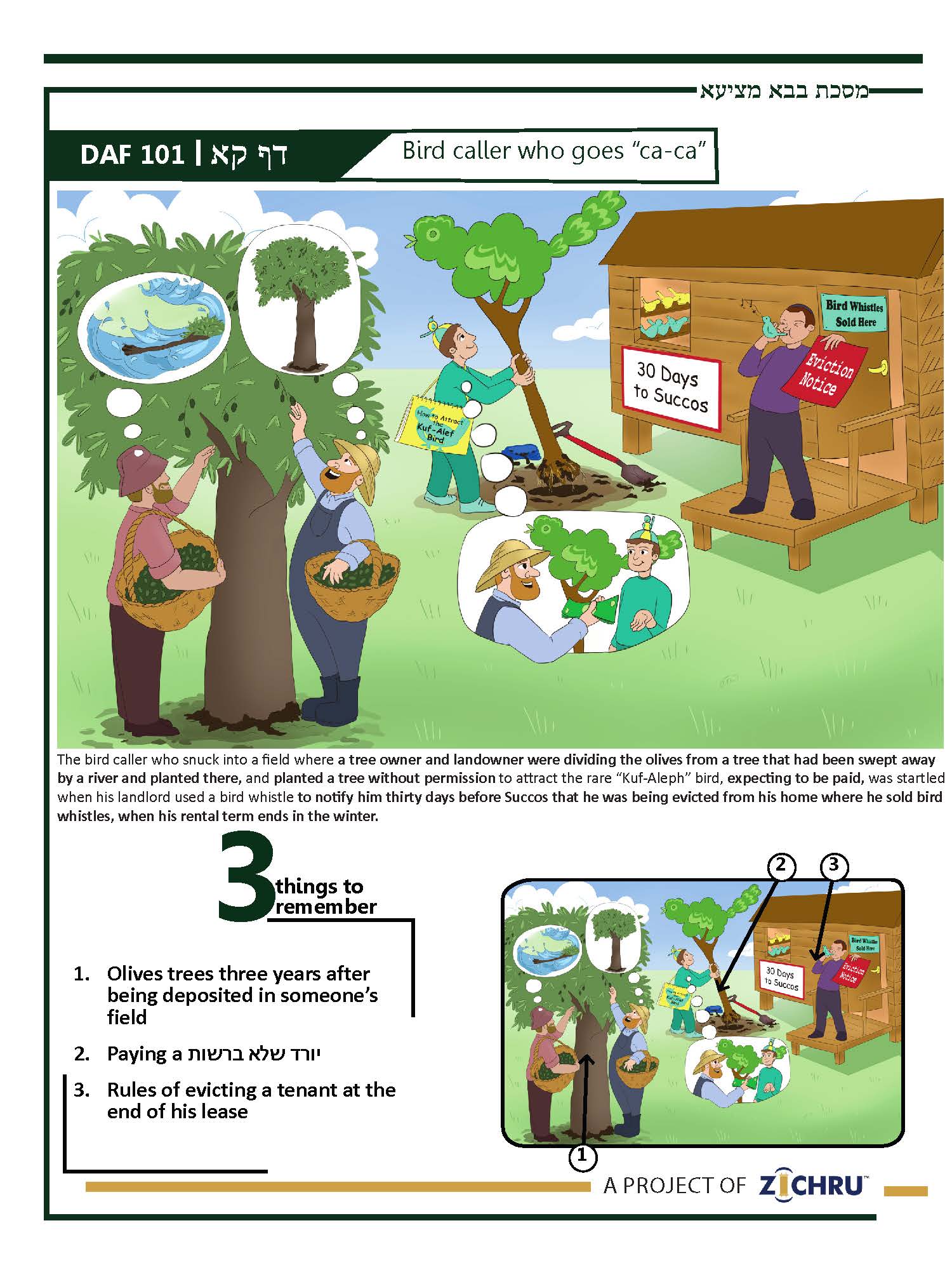Bava Metzia - Daf 101
- Audio Timestamps
0:00 - The 3 Sugyos
3:07 - Review of 3 Sugyos
6:05 - Siman
9:22 - 4 Blatt Back Chazarah
17:00 - Pop Quiz (Last 7 blatt)
- For access to all Zichru resources including PDFs, and illustrations CLICK HERE
- Olives trees three years after being deposited in someone’s field
The Mishnah taught that if olive trees were swept by a river into someone else’s field and produced olives there, the olives are divided between the trees’ owner and the field’s owner. Ravin quoted Reish Lakish saying that they are only divided if the trees were uprooted with their clods of soil, thus maintaining their status as having passed the orlah prohibition period, and only during the first three years. After the first three years, however, הכל לבעל הקרקע – all the olives belong to the landowner, because he can tell the owner of the trees, “If I had planted my own trees three years earlier, לאחר שלש מי לא הוה אכילנא ליה כוליה – would I not be eating all the produce after three years (when the orlah prohibition passes)?” The Gemara asks that the trees’ owner could argue that if he had planted trees earlier, he would have nothing during the orlah period of the first three years. Since he enjoyed half the produce then, he should continue to divide it now!? It answers that the landowner can respond that if he had planted young trees, he could have planted and eaten vegetables during the orlah period (since the young trees do not block much sunlight).
- Paying a יורד שלא ברשות
The Gemara says: היורד לתוך שדה חבירו ונטעה שלא ברשות – If one went down into his fellow’s field and planted trees without the owner’s permission, Rav says: שמין לו וידו על התחתונה – they assess his expenses and the improvement’s value, and he has the lower hand, i.e., he is paid the lower of the two amounts. Shmuel says: אומדין כמה אדם רוצה ליתן בשדה זו לנוטעה – they assess how much a person would want to pay for someone to plant trees in this field, and he pays that amount. Rav Pappa clarifies that there is no argument: Shmuel is discussing a שדה העשויה ליטע – a field which is suitable for planting trees (more than grain), and Rav is discussing a שדה שאינה עשויה ליטע – a field which is not suitable for planting trees (more than grain). This opinion of Rav was inferred from an incident in which a landowner told Rav that he did not want the trees which were planted in his field, and Rav replied that he should pay the lower amount of either the expenses or improvements, since the field was more suitable for grain. The owner eventually fenced in the field and guarded it, and Rav told him that he revealed his satisfaction with the trees planted there and must pay the planter like a normal planter.
- Rules of evicting a tenant at the end of his lease
The next Mishnah teaches the laws governing evicting a tenant at the end of his lease. As the Gemara explains, the Mishnah’s rulings are להודיע – to notify a tenant that he will be evicted. Thus, the Mishnah states that one cannot evict a tenant whose term ends in the winter (when it is difficult to find other housing) unless he notifies him thirty days before the winter season (i.e., before Succos). In large cities, where it is especially difficult to find housing, he must notify him a full twelve months before his term ends that he will be evicted. A Baraisa supports this reading and adds that a tenant must also notify his landlord that he plans to leave at the lease’s end, so he may find a suitable replacement. If the landlord’s house fell, he may tell the tenant: לא עדיפת מינאי – “You are no better than I,” and he must leave at the end of his term even without prior notice (since the landlord did not know his house would fall and must himself find housing). If he sold, bequeathed, or gifted the rented house to another, the tenant has the same entitlement to notice before eviction from the new owner.
Siman – Bird caller who goes “caw-caw”
The bird caller who snuck into a field where a tree owner and landowner were dividing the olives from a tree that had been swept away by a river and planted there, and planted a tree without permission to attract the rare “Kuf-Aleph” bird, expecting to be paid, was startled when his landlord used a bird whistle to notify him thirty days before Succos that he was being evicted from his home where he sold bird whistles, when his rental term ends in the winter.


